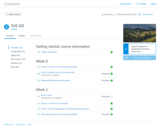
Introduction to Environmental Science and Sustainability Canvas Commons Course
SUS 102
General Description:
This course serves to introduce students to the science behind critical environmental debates and the biological basis of creating and maintaining sustainable ecosystems. This course focuses on critical thinking skills to assess such questions as: how do we decide what to believe about environmental issues? How do we predict trends in population growth, or climate change? How do we calculate and understand uncertainty in these predictions? Should people eat lower on the food chain? How are human activities linked to the phosphorus and nitrogen cycles, and pollution and eutrophication? How can fisheries be made to be more sustainable? How can we quantify and value biodiversity? Can we restore “natural” ecosystems and should wolves be re-established in the west? What is valid science in the global warming debate?
Learning outcomes
Upon completion of this course students should have the ability to:
• Recognize and apply concepts and theories of population biology to interdisciplinary fields such as conservation ecology;
• Apply principles of evolutionary dynamics and ecosystem biogeochemistry to understand and predict effects of pollutants such as heavy metals, pesticides, or acid rain on ecosystems;
• Effectively debate and evaluate scientific arguments behind such diverse fields as genetically modified organisms (GMOs) or organic vs. conventional farming;
• Interpret data critically, and understand uncertainty in scientific data and model prediction in such diverse fields as nitrogen saturation and global climate change;
• Calculate carbon footprint, water footprint of human activities
• Develop an awareness of the responsibilities of professional scientists.
- Subject:
- Applied Science
- Environmental Science
- Material Type:
- Full Course
- Author:
- Kate Lajtha
- Date Added:
- 03/15/2021